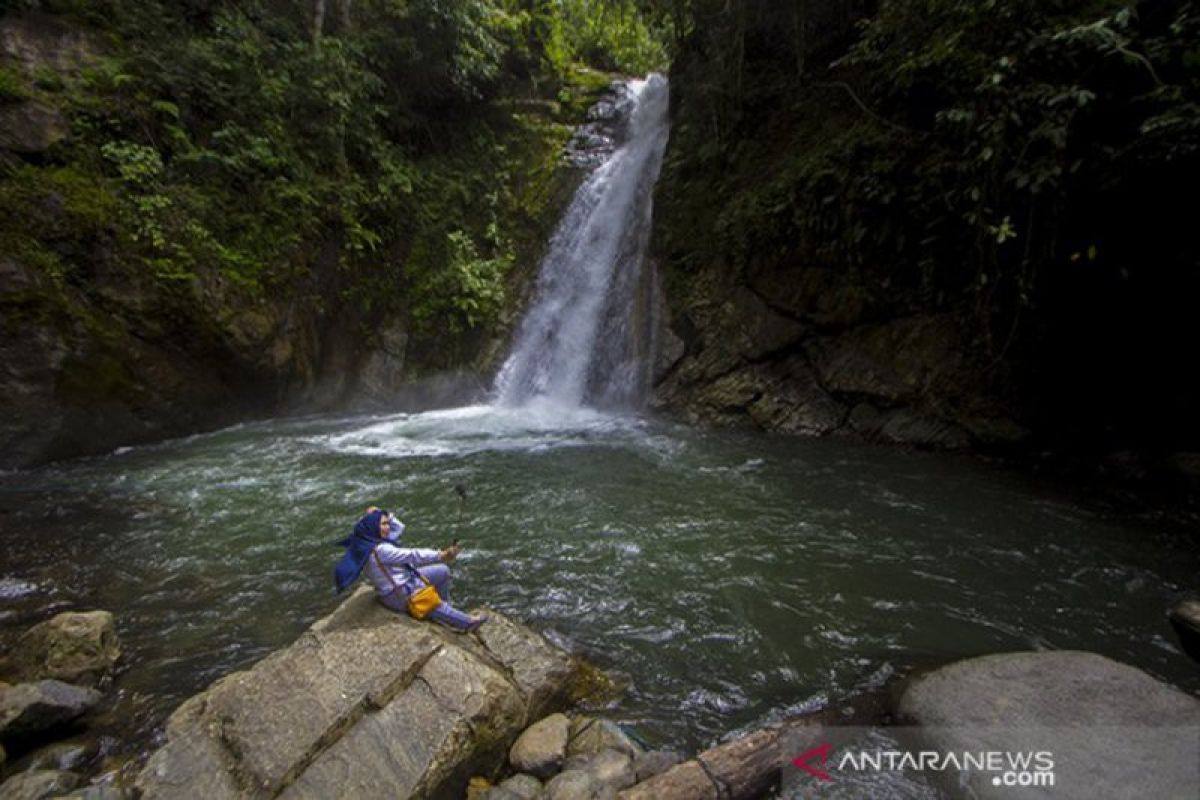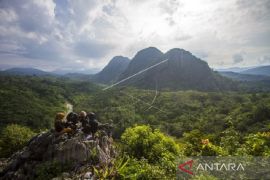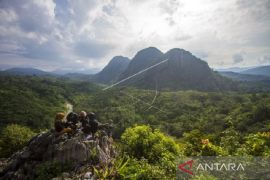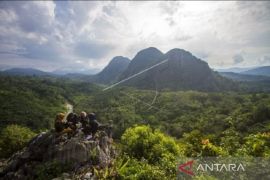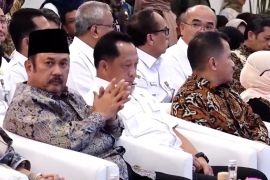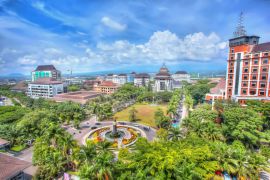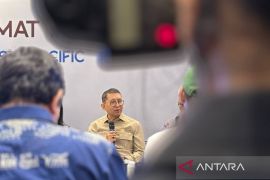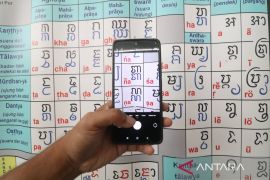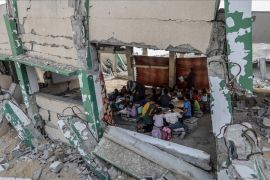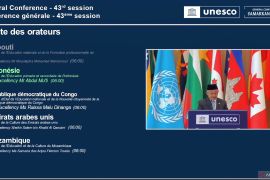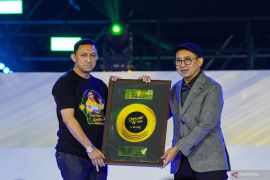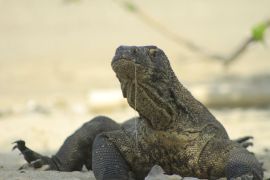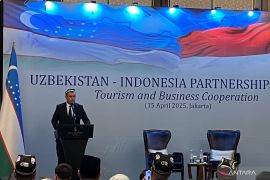Meratus Mountains are composed of oceanic crust called ophiolite uplifted to the surface since 150-200 million years ago.
A collision between two continents lifted upward the oceanic crust, from six thousand meters below sea level and exposed to more than one thousand meters above sea level to create the Meratus Mountains.
The complex geological history makes the Meratus Mountains rich in geological diversity ranging from waterfalls, hot springs, various landscapes, karst, and minerals, such as diamond and coal.
The geological process also affected the area's biodiversity.
The mountains span 600 square kilometers across South Kalimantan, Central Kalimantan, and East Kalimantan, but most of them are located in South Kalimantan.
The highest point of Meratus Mountains is on Mount Halau-Halau, South Kalimantan, about 1,901 meters above sea level.
"Meratus is the oldest mountains in Indonesia, the widest, and perhaps the most variative (in biodiversity). This is the reason why we have to save Meratus," a geologist from the Pembangunan Nasional University (UPN) Yogyakarta Veteran Jatmika Setiawan remarked.
The concept of geopark was chosen as the most apt approach to save Meratus, given the fact that the earth is the main focus to be saved.
"By saving the earth (in Meratus), it means we are also saving the flora and fauna and the humans who live in it," Setiawan stated.
Geopark is one of the sustainable development programs that prioritizes three pillars of development goals: conservation, education, and development of people's sustainable economy.
Indonesia currently has 19 geoparks, six of which have international status (UGGp) and 13 geoparks with national status.
Meratus has been declared a National Geopark in 2018. It is currently preparing to gain the UNESCO Global Geopark (UGGp) status.
The South Kalimantan provincial government has made various preparations, including completing the documents to be submitted to UNESCO, improving infrastructure at the geosites, and educating local residents about the geopark.
In fact, the local government has encountered various obstacles in materializing the idea.
Some parties still questioned the ability of the geopark concept in saving the environment in Meratus Mountains.
South Kalimantan branch of WALHI, a non-governmental organization in environment, has questioned the ability of the geopark to save Meratus.
"The threat against Meratus is so real, especially from the gold and coal mining sector. Will the geopark be able to overcome that," Executive Director of South Kalimantan’s WALHI, Kisworo Dwi Cahyono, questioned.
He stressed that Meratus Mountains should be off-limits for the extractive industry that uses raw materials obtained directly from nature.
"If the goal (of the geopark) is for conservation and the welfare of the community, let us work in collaboration," he remarked.
Kisworo also questioned the involvement of indigenous people in determining the geopark status.
"Indigenous people are not involved in determining the geopark status. In term of conservation, they also have their own spatial planning. There are sacred areas that cannot be disturbed," he said.
Mutual concern
Responding to WALHI's doubts, Deputy Chairman of the Meratus Geopark Management Agency (BP Geopark Meratus) Nurul Fajar Desira said that the determination of Meratus Mountains as a national geopark would be an opportunity for South Kalimantan to save Meratus.
"We have the same concerns," Desira said.
He revealed that the exploitation of Meratus had been ongoing for a long time. Ironwood and Meranti wood, which could be found easily in the 1970s, had depleted within a decade with the growth of the plywood industry.
"Now, it is the turn for coal to be excavated, and mining permits were issued. We then found gold. Meratus' wealth is indeed extraordinary, and this (the exploitation) will continue if we do not do anything," he stressed.
He noted that the geopark program is an opportunity to open everyone’s eyes, including of entrepreneurs, that the industry can run in parallel with environmental conservation.
"We have to start this. We appreciate WALHI's stance, as that is the way environmentalists work. However, we must move based on regulations and could not arbitrarily revoke the (mining) permit," Desira stated.
He noted that the geopark is a gradual development to build the society's awareness towards the preservation of the earth, so that people will view it from a different perspective.
With its determination as a national geopark, Meratus will attract people's attention nationwide, and they can be invited to take part in the conservation of Meratus Mountains.
Desira admitted that the local government lacks communication with the indigenous people in the determination of Meratus as national geopark despite BP Geopark Meratus having made approaches and conducted training for Tourism Awareness Groups (Pokdarwis).
"Now, as we are pursuing the UNESCO (global geopark status), the communication with indigenous people will be continued," he remarked.
Selling impressions
Meanwhile, Jatmika Setiawan emphasized that the concept of a geopark would save geodiversity, biodiversity, and the culture of people living in the Meratus area.
The motto of a geopark is to preserve the earth and to prosper the community, he said.
"By making the geopark a tourist area, we will sell the impression, not sell the assets," he noted.
"Without damaging Meratus, we can sell everything, natural beauty, cultural works," Jatmika said.
He remarked that even if it has been mined, some section should be left for education. Furthermore, the formerly mined sites would become geological tourism assets when the mining operations were stopped.
He cited the example of Breksi Cliff in Yogyakarta that used to be a stone quarry.
In 2014, mining operations were stopped following an order from the local government. Breccias rock in the area was known to be the result of volcanic activity of the Nglanggeran Ancient Volcano.
It then became a protected area and was operated as a tourist attraction that generated an income of Rp2 to Rp10 billion per year for the region.
"The local government has no authority regarding mining permits, but it has a bargaining aspect that if permits have been issued, it can be arranged, so that the ex-mining sites can become geosites for geological tourism," Setiawan stated.
By becoming a UNESCO Global Geopark, Meratus is even safer, as it would not only be protected by national certificates but the world will also play a role in saving Meratus.
Related news: Proposal file streamlined for UGG tag for 11 world-class geosites
Related news: Meratus Geopark management to hold photo exhibition at GFJA
Editor: Rahmad Nasution
Copyright © ANTARA 2022
